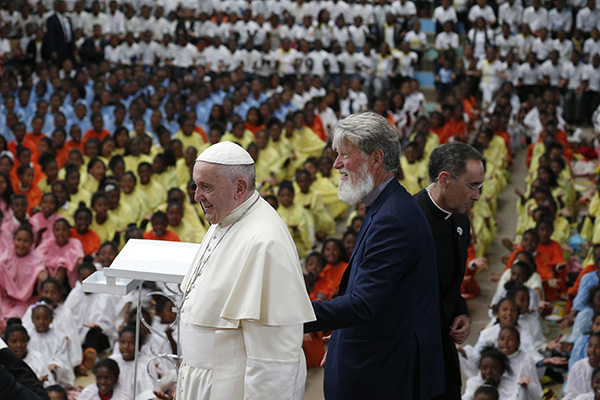
By Inés San Martín
ANTANANARIVO, Madagascar — During his Sept. 4-10 visit to the 3 M’s of the Indian Ocean — Mozambique, Madagascar and Mauritius — Pope Francis saw firsthand three nations full of inequalities: the first two, marred by violence and poverty, and the third, considered the most developed country in Africa.
Yet each of his stops had one thing in common: the joy with which the people welcomed this man, who hails from the “end of the earth” as he put it. Millions came to see him, almost as if no one — Catholic, Muslim or Hindu — wanted to miss his blessing as he passed by them in the popemobile.
This was evident on Sept. 8 on the grounds of the Diocese of Soa Mandrakizay, where one million Malagasy people took part in Pope Francis’ only open-air Mass in Madagascar.
Those who follow Jesus cannot do so by identifying him with their own agenda or ideology, abusing the name of God or religion to justify “acts of violence, segregation and even murder, exile, terrorism and marginalization,” Pope Francis said during his homily.
Pope Francis also said that Jesus demands his followers not dilute or narrow the Gospel’s message, but instead “build history in fraternity and solidarity, in complete respect for the earth and its gifts, as opposed to any form of exploitation.”
The pope then went on to quote the Document on Human Fraternity, which he signed in Abu Dhabi in February, on coexistence between people of different religions, particularly between Christians and Muslims.
Christians, Pope Francis said, should practice “dialogue as the path; mutual cooperation as the code of conduct; reciprocal understanding as the method and standard.”
Later that same afternoon, Pope Francis once again saw the love with which the people of Madagascar prepared for his visit, as he went to Akamasoa, a project of fellow Argentine Father Pedro Opeka. During the past 30 years, Father Opeka has helped build 5,000 brick homes, where more than 28,000 people now live, lifting them from extreme poverty.
As Pope Francis was in Antananarivo — where homes have electricity and hot water, a luxury in a country where over 70 percent of the population lives on less than $2 a day — the pontiff said that “poverty is not inevitable.”
“Seeing your happy faces, I give thanks to the Lord who has heard the cry of the poor and shown his love in tangible signs like the creation of this village,” Pope Francis said. “Your plea for help — which arose from being homeless, from seeing your children grow up malnourished, from being without work and often regarded with indifference, if not disdain — has turned into a song of hope for you and for all those who see you.”
Every corner of Akamasoa, every school or health-care center is a “song of hope,” Pope Francis said. Upon his arrival, Pope Francis was visibly moved by the hundreds of children who welcomed him singing Dios está aquí — God is here — a Spanish song few Argentine Catholics don’t know, as it’s often sung at Masses throughout the pope’s country.
The children had practiced the song under the guidance of Father Opeka. “When the population of Akamasoa found out about the pope’s visit, they burst into screams of joy and happiness,” Father Opeka said.
“Our population realizes that it’s a special grace to welcome the pope in a place where there used to be a lot of violence, suffering, poverty, dramas and deaths of innocent people,”Father Opeka said in an interview before the papal trip. “This visit will be an incredibly ray of light for our people that fights day in and day out to offer a better future to their children.”
